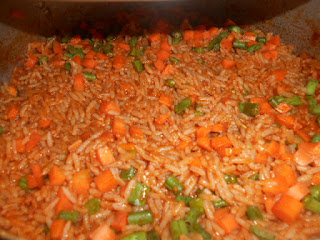The jollof rice is arguably one of the most common meals in
not only Nigeria, but key parts of West Africa. I can boldly tell you that no formal or informal celebratory event is complete without our jollof rice.
WHAT IS JOLLOF RICE?
I have a hard time defining what jollof rice is and I don’t
think I even understand what Wikipedia is saying. And Oxford Advanced Learner’s dictionary is so inadequate nowadays it’s
nearly appalling. So if you don’t know what jollof rice is eat it at your
nearest restaurant and you’ll get a definition.
WHERE IS JOLLOF RICE
FROM?
It’s from West Africa. Its origins are cause of heated
debate between Nigerians and Ghanaians. But there is an even greater chance
that the jollof rice didn’t come from either one of these countries, it might
have originated from the then Senegambia. From the Wolof; they are also referred to as Chelofes, Galofes, Lolof, Jolof,
Olof, Volof, Wolluf and Yolof tribe and language. There are also more
arguments that it is impossible for a dish to become so widespread from that
particular source, so theories that the Mali empire that often introduced new
culture with their trade introduced this rice to other West African countries.
However, all these are speculations. It is to be noted that all countries have
different variants of making this jollof rice.
So…
WHAT ARE THE
INGREDIENTS OF NIGERIAN JOLLOF RICE?
1.
Rice
2.
Tomato (canned or fresh)
3.
Pepper
4.
Onions
5.
Spices (curry, thyme, knorr etc.)
6.
Groundnut Oil
7.
Meat stock (Or any stock you have) Meat stock is
basically the water that was used in boiling meat. It is good for adding flavor
to your dishes.
8.
Crayfish
HOW TO MAKE JOLLOF
RICE
1.
Put groundnut oil into your pot and heat.
2.
Slice onions and put into the heating oil.
3.
Blend your fresh tomato crayfish and pepper
until it has turned into a fine paste then add into your oil. Or if you’re
using canned ones, you can just add the ready-made paste into the sizzling oil.
4.
At this point you are free to add your spices,
including meat stock into the mixture.
5.
Then you can focus on boiling your rice. Parboil
it so the starch comes off and then sieve it and add some salt.
6.
After allowing your sizzle to sizzle for a short
while you can add proportionate water (proportionate with the rice so the water
boils away just as the rice is cooked) with some spice (salt and pepper to your
desired taste).
7.
Add your rice, cover the pot and let it cook.
Once it’s done the water would have dried up and the food should be ready.





No comments:
Post a Comment